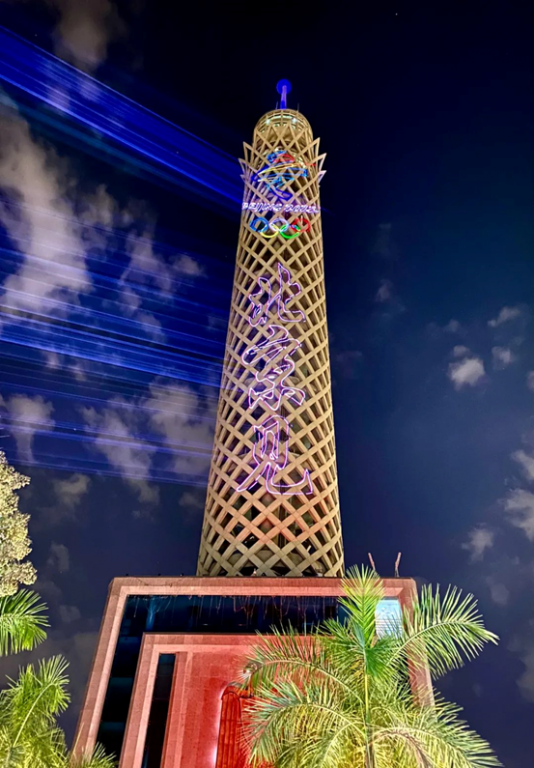
By Huang Peizhao, People’s Daily
“I still vividly remember President Xi Jinping’s visit to the ancient Egyptian capital of Luxor though it’s been more than six years,” said Mamdouh Mohamed Gad Eldamaty, archaeologist and former antiquities minister of Egypt, in a recent interview with People’s Daily.
Chinese President Xi Jinping paid a state visit to Egypt from Jan. 20 to 22, 2016. Eldamaty accompanied him twice during the Chinese President’s stay in the African country.
On Jan. 21, President Xi attended a celebration of the 60th anniversary of China-Egypt diplomatic relations and the opening ceremony of the China-Egypt Cultural Year 2016, together with President Abdel-Fattah al-Sisi of Egypt at the ancient Square of Luxor Temple.
“I was the guide for the two heads of state at the Luxor Temple,” Eldamaty recalled, saying at the temple, the two leaders talked about the characteristics of the ancient Chinese and Egyptian civilizations and reviewed the long history of mutual learning between them.
President Xi noted that both China and Egypt are ancient civilizations, so it’s necessary for them to strengthen people-to-people and cultural exchanges, deepen non-governmental friendship, and consolidate public support for bilateral cooperation, so as to promote common development and prosperity of both sides.

“What President Xi said mirrored his insight into the history and his strategic vision,” Eldamaty told People’s Daily.
On the next day, President Xi visited the ruins of the ancient Egyptian civilization in Luxor. Again, he was accompanied by Eldamaty.
“While watching the heritages, President Xi communicated with me. He showed a deep interest in the ancient Egyptian civilization,” Eldamaty recalled.
“He shook my hands to express his thanks when the visit was over. His erudition, horizon, passion for culture, and humility left a deep impression on me,” Eldamaty said.
During President Xi’s visit to Egypt, he delivered an important speech titled Work Together for a Bright Future of China-Arab Relations at the Arab League Headquarters in Cairo.
Eldamaty said the speech left a lasting impression on him. “President Xi’s speech offered guidance for the cultural exchanges and mutual learning between Egypt and China, and between the Arab world and China,” he noted.
“I agree with President Xi’s proposal to promote equality, mutual learning, dialogue, and mutual accommodation between civilizations. We need to replace estrangement with interaction and sharing, replace conflict with harmonious co-existence, and replace a sense of superiority with respect for diversity,” Eldamaty told People’s Daily.
Citing a proverb in Arabic that “Seek knowledge even if you have to go as far as China,” Eldamaty noted that the ancient Silk Road witnessed the common prosperity of the Arab and Chinese civilizations, which was the result of close exchanges and mutual learning.

The land and maritime Silk Roads, as a bridge linking the East and the West, promoted the progress of human civilization, he added.
“Today, the Belt and Road Initiative (BRI) proposed by President Xi has revitalized the ancient Silk Road, and is bringing closer China and Arab countries in economy, trade, culture, and other sectors,” Eldamaty remarked, saying the initiative is building a new paradigm of international cooperation featuring win-win results, guided by the principle of extensive consultation, joint contribution, and shared benefits.
During the interview, Eldamaty highlighted a series of China-Egypt cooperation outcomes. According to him, a joint archaeological team consisting of Chinese and Egyptian scientists has unearthed a number of buildings and valuable relics buried in ruins at the Temple of Montu, Luxor; two Luban Workshops were launched at Egypt’s Ain Shams University and Technical School for Advanced Maintenance Technology, Cairo, which marked further steps of vocational education cooperation between the two countries.
Besides, steady progress is being made in the construction of the central business district in Egypt’s new administrative capital, and the China-Egypt TEDA Suez Economic and Trade Cooperation Zone had attracted over 120 enterprises as of the end of 2021. The cooperation zone was considered an industrial park with the best environment, the highest density of investment, and maximum production output per unit in Egypt.
“The alignment between the BRI and Egypt’s Vision 2030 has increasingly tightened the bond of friendship and cooperation between the two countries. We are very confident in building a brighter future of common prosperity,” Eldamaty said.










